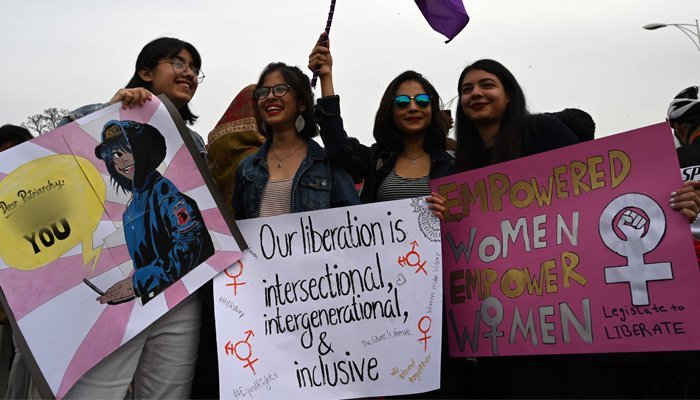The immodest march
There is so much to be angry about and so much to fight, one could almost be forgiven for buckling
March 16, 2020

Men think they know women better than women. They know our lived experience. They know our pain (as the root of it, they are at an unfair advantage). When we demand that our rights be fulfilled, they know which ones must come first.
As demonstrated by some reactions to the Aurat March, they prefer that we fight for their right to our bodies before we even consider the notion that well, our bodies belong to us.
They also would like it known that demanding access to menstrual projects makes us vulgar (since we happen to be fully in charge of when we bleed and when we don’t). They have made it clear that freedom from sexual violence can only be found under a veil, inside our homes – never mind that hijab-clad women have been raped in their childhood beds by brothers, fathers, friends, husbands and house staff. They have even, very kindly, decided to show us the way by showing us what a model march to demand women’s rights may look like.
Women from the Jamaat-e-Islami, Jamiat-Ulema-Islam-F and Lal Masjid staged, what they referred to as the ‘Haya March.’
You see, when you participate in the Haya (or modesty) March, you show up to the same space as that occupied by Aurat March. On the one day in the whole year that women can claim the streets as their own, you show them that they cannot. You come armed with righteousness. You chant that Islam gives you rights – and you are correct about that and will find no contest from the Aurat March on that front. You denounce the lack of dignity in placards, regardless of what they say.
When you find that you are outnumbered, that your calls for shame are being drowned by calls for equality, that you are only separated by a cloth barrier, you throw stones.
You chuck rocks at participants. You do not discriminate between adults and children. You throw chilli powder into the eyes of the person closest to you. You want to hurt the Aurat March, for daring to demand a life free from violence, fear, discrimination and moral policing.
There is so much to be angry about and so much to fight. One could almost be forgiven for buckling.
But then, a video surfaced of the inimitable organizers of the Aurat March. They stood their ground, stared the Haya Marchers right in the eye and with all the calm of a steadfast mountain flashed them the peace sign. They came in peace, wanting peace. Even as the crowds thronged the space offered to them in Islamabad, there was always room for those wanting to learn how to build a world where women could be okay.
And that is precisely what the Aurat March wants. No qualifiers, no fancy buzzwords, no conditions -which is more than what political parties can say.
As testament to women having to fight for space everywhere, all the Aurat March asks for is for an ear. They work twice as hard to get a fraction of the space that Khalil-ur-Rahman’s outburst on national television got. They do not get the invites to come back on television shows the next day to give explanations.
When serial-litigator (and not much else) Azhar Siddique petitioned the Islamabad High Court to ban the Aurat March, it took the unpaid and hard work of women lawyers to go and challenge it, and cost even more so in time in having to explain why he was wrong. Photos of women carrying placards are doctored and distributed. The damage it causes to the narrative around the Aurat March cannot be Photoshopped away so easily.
The government, it appears, is very concerned about not ruffling the feathers of polite society, more than making adequate and fool-proof security arrangements in the capital city where peaceful demonstrators were attacked. The Deputy Commissioner of Islamabad tweeted that the Haya March participants did not even have a No-Objection Certificate. It took a High Court order for Aurat March to secure the same permissions. That the Haya March didn’t think they needed one, and the fact that they could still take to the streets unhindered, speaks volumes.
The threat level, indicated by defaced murals, tearing down of Aurat March posters, legal action and harassment, was not unbeknownst to the authorities. They should and could have done better.
But we won’t be getting any apologies. Not for our unpaid labour. Not for the wild accusations about clandestine funding. Not for our work to unlearn the patriarchy. Not even for our deaths at the hands of domestic violence, acid attacks, so-called honour, physical and sexual assault. No, they appear to be too powerful to be remorseful.
And yet, we’re the ones who are called immodest.
Mohydin is the South Asia Campaigner at Amnesty International. She tweets @Rimmel_Mohydin











